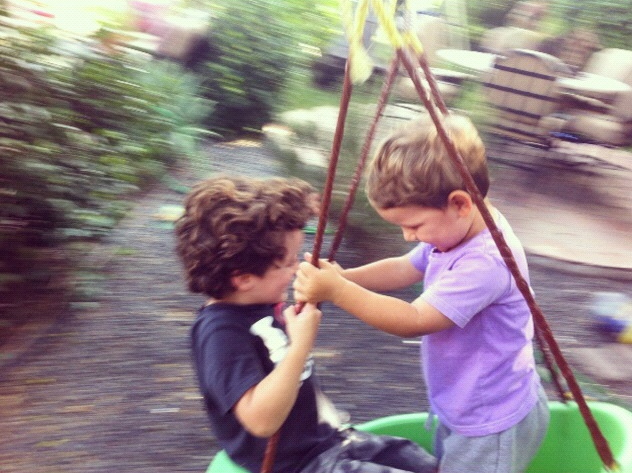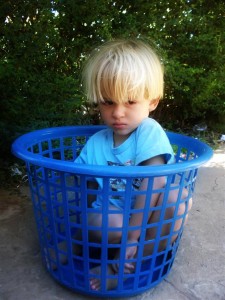
I was recently asked by a few people to write on the subject of behavior and how I deal with my boys when things aren’t smooth and easy. Tonight feels like the night to share on this subject. Today was a crazy, challenging day and somehow, we all survived and communicated through it without anyone feeling any worse than we already had within ourselves. There wasn’t enough sleep last night which created a day filled with moodiness, sensitivity, and crying to name a few.
I was having a lupus flare up with major fatigue and to top it off, we got home from a long day only to be locked out! So, I had the boys telling me they were cold and tired, ten bags on my arm, a borrowed ladder from the neighbor, our dog in tow and had to handle this situation. I attempted to climb up to the second story balcony like spider man. As my boys cheered me on, and after calling a few people walking by to assist, we were finally successful and opened the door I thankfully left unlocked today! Just another day in the life. Should I share or should I only share my smiles and happiness? I am choosing to share.
One of the things I’ve always believed is that most of us grew up with the feeling of not being good enough. I learned this several years ago and not only did I remember the point in my life when I made that decision, but I began to see the pattern in everyone I knew. That point when you were a child and the world was yours. You were carefree with mismatched socks on, crooked glasses on your face, a missing front tooth and had no idea what perfect or imperfect was. You just walked around fulfilling your curiosity and trying to find your place in this world without knowing exactly what “fitting in” meant yet.
Then, one day, something happened. Someone made fun of you. Someone judged you. Someone pointed out your differences. Someone made you cry. At that point, you made a decision, most likely unconscious, that you weren’t good enough and the negative self image, comparison to others, and quest to fit in or stand out began.
The reason I am mentioning this is because that happened to me and I’ve spent most of my life actually standing on the outside. I wanted everyone to like me and then I realized I cared more about being ME and understood that not everyone would. Today, I want to share with you because I believe that as a parent, or as any human being trying to find your way, you must realize and understand this pattern so you can not only heal yourself, but also do your best to prevent the same feeling from affecting the younger generations of this world. This awareness and transformation begins with ourselves and our children first.
I had no idea what kind of parent I would be. I had no idea what patience was until I had my first child. No idea. I had no idea what unconditional love was although I thought I had known it well. I truly discovered Love, Patience and an Instinct within myself that I had never known. This instinct is what guides me each day. This Love is what allows me to be patient and kind and strong, no matter what.
I didn’t know that the term ‘gentle’ or ‘positive’ discipline existed, yet I knew that’s what I was practicing. Once you hear a term or you hear others doing what you are doing, it makes you feel like you have support, like you are not alone and like you are not as different as everyone says you are.
I am non-traditional in my ways. Yes. I have been judged and doubted and questioned along the way and I’m certain that will continue. That is fine. My sons may cry in front of you or they may throw a fit in a public place. You may stare and say, “Can’t that woman get her kid’s under control?” You may say, “I know her kid’s are crying because she is an attachment parent and she’s still breastfeeding.” Let me think of what else you might say just so you know that I’m already aware you are saying it. “Sandy really needs to do time outs and discipline those boys or they are just going to be crazy.”
Although I wish you would be kind and have empathy for me and all of the other parents or caretakers out there struggling in moments when they can’t control a situation or sad that their child is suffering, I can’t do anything about you or those like you. You either don’t have kids, think yours are perfect, think you are perfect, or have no idea what it is to love so much that you care more about comforting your suffering child, than being embarrassed because someone can’t handle the annoyance of your struggle.
When children act out, they are crying for attention. They are crying because something isn’t right. They are hungry, they are tired, they are frustrated, they are scared. They may simply need you to hold them. That is all that matters to me. Being there for them in those moments. Logic sometimes works. Sometimes it’s just removing them from the situation if they will let you. Sometimes it is just holding them and assuring them that you are there until it passes.
We must breathe deeply and remain calm. Even if that doesn’t seem possible. I don’t ever want to threaten or shame them into anything. I don’t believe in it. When I do the juggling act of distraction that I sometimes find necessary, I do it in order to get them out of the momentary stress they are experiencing. I don’t dismiss what they are going through. I acknowledge their feelings and their point of view once they are able to communicate with me and we move on with the next moment in our day.
I believe that communication is the most important thing. In any relationship. I communicate with my boys and always have. I respect them as people. They know this and this is how we work our issues out. This is how we support one another and learn who we are. Dominance, yelling, threatening, scaring, punishing…I’m sorry. I do not believe in. Think about yourself. When someone does that to you, do you react gently, kindly, respectfully, obediently. Or would you say you are more defensive, angry or hurt? Yes, you may react obediently but what is that. The negative effects of the situations are prolonged, the hurt feelings linger and something is taken away from you. Somewhere along the way, you will feel like you are bad, not good enough, or unloved.
Obedience to me may look good to others and others may comment on how well behaved your children are, but with obedience comes less of their spirt. In my opinion, communication and positive discipline allow for children to be themselves, allows for their spirits to be free and yet they will learn the respect and boundaries needed without crushing their souls and making them compliant robots for the sake of looking good to others.
To be clear, we are all different. I am only sharing what works for me and what I believe. I am not perfect. I can only hope that my example, my choices and my methods will make my boys strong, independent, free-spirited, confident, loving, compassionate, kind men. I hope that they always remember and know how loved they are. I believe it is the gift of feeling loved that gives us what we need in Being who we are supposed to BE in this Lifetime.
Patience and Love. Support and Encouragement. Warmth and Compassion.
I hear you. I understand you. I respect you. I love you.


Editor’s note: Parent support makes a world of difference — when we strengthen families, we nurture and fulfill our children’s need for trust, respect, and affection, and ultimately provide a lifelong foundation for healthy, enduring relationships. Sharing our parenting experiences — the difficult, trying, joyous, and happy ones — with other like-minded parents can help us feel understood and supported. Attachment Parenting International (API) is dedicated to supporting families in realizing the most important job there is –raising compassionate kids who will shape the future of our world. Click here to find an API Support Group near you.






 In Part 1 of this two part
In Part 1 of this two part  But for the most part, we’ve not had to deal with “typical” toddler tantrums. By typical, I mean the ones harried veteran parents always stop to warn you about when they see you cuddling a sweet, drool-soaked little bundle of baby chub in the supermarket. And you would smile and nod sympathetically, edging closer to the clerk (because the parent’s wild eyes and twitchy left nostril are making you nervous) all the while knowing that your child will never be “typical.”
But for the most part, we’ve not had to deal with “typical” toddler tantrums. By typical, I mean the ones harried veteran parents always stop to warn you about when they see you cuddling a sweet, drool-soaked little bundle of baby chub in the supermarket. And you would smile and nod sympathetically, edging closer to the clerk (because the parent’s wild eyes and twitchy left nostril are making you nervous) all the while knowing that your child will never be “typical.”